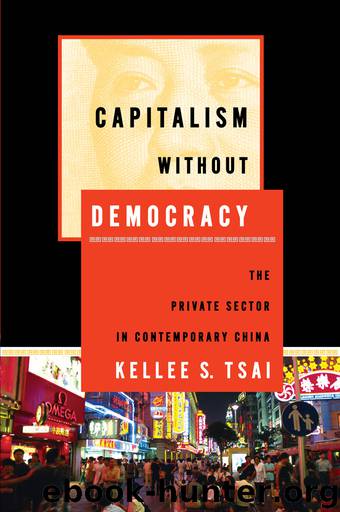Capitalism without Democracy by Kellee S. Tsai

Author:Kellee S. Tsai
Language: eng
Format: epub
Publisher: Cornell University Press
Most business associations are organized by sector and set up to address sector-specific concerns. Consider, for example, the footwear industry business association in Huangbu Township, Huidong County, Guangdong Province (Interview 196). The association is registered as a social organization and it has eighty members who pay 1,000 RMB ($121) in annual dues. The director of the association also happens to be the vice director of the local Federation of Industry and Commerce. The director pays 50,000 RMB ($6,039) in annual dues and holds a three-year term, while the vice directors of the footwear association pay 20,000 to 30,000 RMB ($2,415 to $3,623) in annual dues. All the directors and vice directors are elected through a secret ballot. According to the director, the association helps members with external sales and marketing, enables private entrepreneurs to network with one another and exchange information about the footwear industry, and serves as a means for shoe manufacturers to contact the relevant government authorities when necessary. At the time of our interview in 2002, the footwear association had just submitted a proposal to the government of Huidong County requesting permission to hold a “cultural shoe fair” later that year. They planned to charge vendors 10,000 RMB ($1,208) to display their products at a stand and anticipated that at least five thousand people would attend the trade fair. The association had already contacted reporters at Guangdong Television to cover the event. The proposal said that because Huangbu had twenty years of experience in manufacturing shoes, it was about time they held a formal event to share its accomplishments with everyone else. The county government ultimately accepted the proposal, and the shoe manufacturers were pleased with the opportunity to showcase their products.
In addition to networking, public relations, and marketing functions, business associations can also be helpful in persuading the local government to bend rules in a manner that benefits its members. A real estate business association in another part of Guangdong, for example, received complaints from various developers about a regulation that required prospective home buyers to prove that they are in compliance with the one-child policy by producing the requisite forms at the time of purchase (Interview 192). The local real estate developers thought this was a ridiculous requirement that would harm their business. As a result, the real estate association lobbied the local government to be more understanding about their business concerns, and, sure enough, the local government ignored the regulation henceforth. This shows that sector-specific business associations can also be effective in influencing local governmental practices. But note that the relative success of policy advocacy by trade associations is largely contingent on the extent of convergence of the interests between the local government and the particular sector. Of all sectors, real estate development is probably the one where local officials are most likely to benefit directly from its well-being, because fixed-asset investment provides evidence of local economic growth, which is a key performance indicator against which local cadres are evaluated.
Overall, regardless of sector, entrepreneurs
Download
This site does not store any files on its server. We only index and link to content provided by other sites. Please contact the content providers to delete copyright contents if any and email us, we'll remove relevant links or contents immediately.
| Anthropology | Archaeology |
| Philosophy | Politics & Government |
| Social Sciences | Sociology |
| Women's Studies |
The Secret History by Donna Tartt(19066)
The Social Justice Warrior Handbook by Lisa De Pasquale(12190)
Thirteen Reasons Why by Jay Asher(8897)
This Is How You Lose Her by Junot Diaz(6881)
Weapons of Math Destruction by Cathy O'Neil(6270)
Zero to One by Peter Thiel(5793)
Beartown by Fredrik Backman(5744)
The Myth of the Strong Leader by Archie Brown(5505)
The Fire Next Time by James Baldwin(5434)
How Democracies Die by Steven Levitsky & Daniel Ziblatt(5217)
Promise Me, Dad by Joe Biden(5148)
Stone's Rules by Roger Stone(5084)
A Higher Loyalty: Truth, Lies, and Leadership by James Comey(4958)
100 Deadly Skills by Clint Emerson(4922)
Rise and Kill First by Ronen Bergman(4784)
Secrecy World by Jake Bernstein(4746)
The David Icke Guide to the Global Conspiracy (and how to end it) by David Icke(4712)
The Farm by Tom Rob Smith(4505)
The Doomsday Machine by Daniel Ellsberg(4489)
